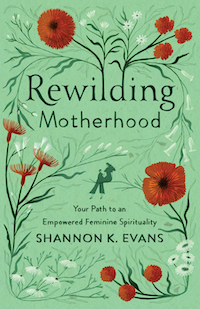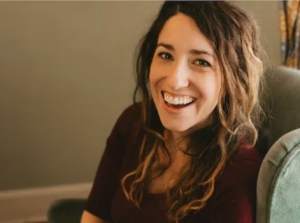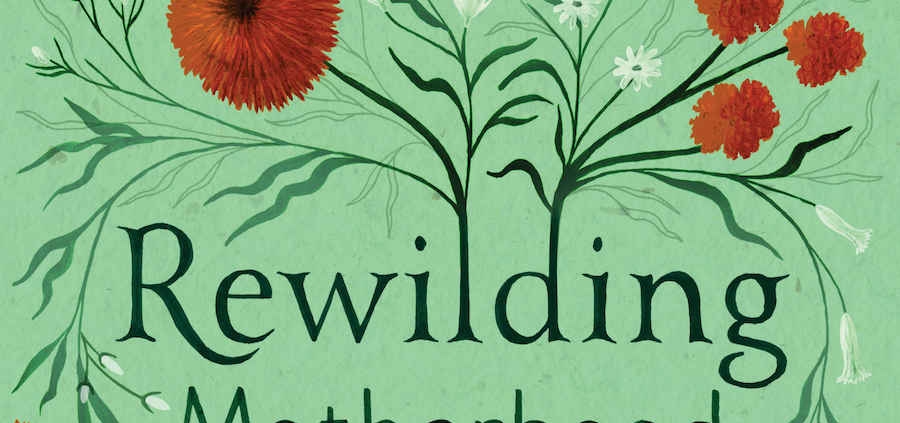Shannon K. Evans on Rewilding Motherhood
Shannon K. Evans is a writer in the contemplative Catholic tradition, a speaker, and an advocate. She is a regular contributor to Franciscan Media’s magazine, St. Anthony Messenger. She also writes the Everyday Ignatian column at Jesuits.org, the official website for the Jesuits of U.S. and Canada. Her latest book is Rewilding Motherhood: Your Path to an Empowered Feminine Spirituality, released this month by Brazos Press. We are pleased to share an excerpt from Rewilding Motherhood below as well as an interview with Shannon on the background of the book, her writing practice, and how the concept of “rewilding” relates to parenting. Thanks to Shannon for taking the time, and to Shelly MacNaughton at Brazos Press for her assistance—Ed.
Patience as a Spiritual Practice
(from Rewilding Motherhood)
There is something nauseatingly precious about the way we envision maternal patience. The picture painted is one of gentle murmurings, lilac flowers, whimsical rainbows—and more than a little bit of doormat syndrome. But the truth can be much different.
When practiced rightly, patience is a force to be reckoned with. It’s revolutionary. Powerful. It is resistance. While the world around us blazes by, demanding consumption, greed, instant gratification, and self-interested exorbitance, the virtue of patience is downright prophetic in its refusal to bow to empire. It’s like how gardening looks harmless and sweet while in actuality it is dismantling hierarchy, scarcity, capitalism, and environmental degradation. If patience was a hobby it would be gardening.
 Happily, slowness is making a bid for reemergence these days: we see it everywhere from the fashion industry (“slow fashion” as the antidote to “fast fashion”) to food production (farm-to-table fare instead of fast food) to recreation (popular new fads like “glamping”). It’s no coincidence that increased global consciousness is at the heart of these changes; we can clearly see that many of our habits are not sustainable for either personal or collective health. The human race innately knows we cannot thrive for long by outpacing ourselves. We must relearn patience.
Happily, slowness is making a bid for reemergence these days: we see it everywhere from the fashion industry (“slow fashion” as the antidote to “fast fashion”) to food production (farm-to-table fare instead of fast food) to recreation (popular new fads like “glamping”). It’s no coincidence that increased global consciousness is at the heart of these changes; we can clearly see that many of our habits are not sustainable for either personal or collective health. The human race innately knows we cannot thrive for long by outpacing ourselves. We must relearn patience.
The environment is begging us to slow down. The poor and underserved are begging us to slow down. Medical professionals are begging us to slow down. Garment workers and farmers are begging us to slow down. Rain forests are begging us to slow down. Our children are begging us to slow down. Cultivating a spiritual practice of patience one day at a time, even one moment at a time, has the potential to spill over into every layer of society and carry with it the seeds of change that could very well save the world if each of us had this inner resolve.
Our need for more patience is not only about the way we relate to our children; it’s not even mostly about that. We moms expend a lot of emotional energy on cultivating patience with our children: we commiserate about it in moms’ groups; we read every parenting book under the sun; we shoulder self-imposed guilt; and we seek answers from mentors and therapists. And yet few of us put forth any effort to cultivate patience outside of our role as a mother.
But your motherhood does not exist in a vacuum; everything is connected. If you pray to become a more patient mother yet have not considered how to open up that stream to other parts of your life as well, you aren’t likely to see much change. On the other hand, if you reframe the pursuit of patience to explore what it means to be a whole person who patiently finds her being in the world—including, but not limited to, your role as a mother—you might just find yourself on the cusp of a trans- formation. If you hope to be more patient with your child, you must also prepare to become more patient with your partner, yourself, your society, your earth, your ambitions, your body, and your work. It’s the best game of dominoes you will ever play.
When we cultivate patience as a spiritual practice, we learn to love ourselves for our small but earnest attempts at self-betterment; in so doing, we learn to love those around us for theirs. We begin to believe that being is higher than doing, that awareness is higher than hustle. Radical patience says, “I will not be owned by another—whether mass marketing, family members, economics, or culture.” Patience is stubborn, defiant, and unstoppable. Patience is a woman who belongs to herself.
Content taken from Rewilding Motherhood by Shannon K. Evans, ©2021. Used by permission of Baker Publishing www.bakerpublishinggroup.com.
Mirroring Back a Wilder God:
An Interview with Shannon K. Evans
The title of your new book is Rewilding Motherhood. Can you tell us a little bit about the concept of “rewilding” and how it might be applied to the work of parenting? How does it fit, if at all, with ideas of “slow parenting” or “free-range parenting”?
Rewilding is a term used by environmentalists to describe the conservation effort of allowing a piece of land to heal itself from the effects of harmful human intervention. Letting the land return to its natural state, and gently assisting it in that process, results in renewed biodiversity and a healthier ecosystem. It’s a way to protect the natural process of the earth; an attempt to rewind the clock for the way we humans have done harm.

Shannon K. Evans
When I was brainstorming titles for this book, I came across the term “Rewilding” and it carried incredible resonance for what I hoped to accomplish in writing a book about motherhood as a spiritual path. It begs the question, “What if every mother could leave behind the harmful social input about mothering and allow motherhood to rewild itself into a space that invites us to know ourselves and to experience God in a primal, very organic way?” So I believe it does belong in conversations about slow or free-range parenting, but at the same time it is a different concept. Rewilding motherhood is more about the woman’s inner journey than about her parenting style.
In the book, you make a great case that toddlers should be able to receive Communion while the rest of us are restricted, that it might teach us something of their inherent mysticism. As you put it: “Let the age of unreasonableness mirror back to us a wilder God.” What does the institutional Catholic Church get wrong about parenting, and motherhood more specifically? How might our church be better equipped to welcome young families, and how might we, as parishioners, better learn from our younger brothers and sisters?
Well, I wrote that a little tongue-in-cheek because I think shock value can be useful in jarring us out of a static way of thinking. But, yes, I think the whole idea of who is and who is not “worthy” to receive the Eucharist is a curious one—especially since the prayer we pray together beforehand is a confession of our unworthiness. No one is worthy, that’s the whole point! The pure unrefined humanity of children is really a microcosm of the human experience. They put our truest selves on display; perhaps that’s why we feel so uncomfortable having them in sacred spaces.
As far as what the Church can do better, I think expanding our approach to children’s faith formation is long overdue. They are bored to tears sitting in classrooms being taught lessons. Most of them are bored to tears during Mass. What does this communicate to them about God? How can we captivate them instead? Or perhaps, more accurately, how can we use their own natural captivation with God to teach them how to access practices or feelings that help them experience God’s love and presence? How can we help them find ways to put their love for God into action in the world? This is the direction I would hope we are headed. But as a parent, I feel very frustrated with the institutional Church’s offerings for kids right now.
There can be messages within our religious traditions that lead us away from creativity: the notion that we are not to “compete” with God; a distrust of our imaginative faculties; prohibitions on “graven images” that, when taken to extremes, can turn us away from even healthy creative expression. You speak of how a deeply religious period led you to stop writing for a time. What did you learn about yourself as a writer and as a mother during this period, and how did you navigate your way back to the practice of writing?
For me, the departure from creative expression was not conscious. It wasn’t that I thought I was prohibited from using my creativity, but moreso that it was a waste of time. I was inundated with messages that direct evangelization was the most important way to spend a life. I also felt a deep urgency to participate in righting social wrongs, engage in the works of mercy, etc. Spending my time reading fiction or writing my own thoughts felt vain and superficial. I was really doing what therapists call spiritual bypassing: using spiritual or religious language to avoid examining myself or the systems that surrounded me.
I entered motherhood through adoption. Our first child came to us at almost a year old, and it was hard for a very long time. He suffered in ways I couldn’t help, and I suffered in ways no one else could help. There was a lot of love between us, but the weight was so heavy. And I think it was the grace of God that I started writing as a way to cope. I started reading fiction again. Started re-engaging with my imagination, with my own thoughts and feelings and not just the echo chamber I had been in. Through hardship I began to find my own voice again, and writing was a way to make it tangible.
The Covid-19 pandemic upended many families’ schedules and routines. There was also a lot of talk, especially early on, about how the decline in human activity was “rewilding” our natural environment: there were reductions in air, noise, and water pollution, wildlife returned to cities, and birds even modified their songs. How did your family cope with the pandemic? Did it offer any opportunities to “rewild” motherhood and family life that you have adopted in post-pandemic times?
Those first few months of the pandemic were incredibly scary, but there was also something refreshing about them. Having the world stop like that freed up so much time to listen to our souls and reflect on the motivations and prioritizations behind what we were spending our time on. Having that sudden empty space really nurtured this calling I felt to write down what I had been experiencing as a woman and mother the past few years. So I guess the book is a pandemic baby in that way.
And about six months into the pandemic, my husband and I switched roles. He left his job to stay home with the kids and work part time as a spiritual director, and I became the primary wage earner. We were both burnt out on the roles we had been serving, and realizing that we had the freedom to simply switch places was pretty revolutionary. It was definitely a rewilding experience for both of us.
Rewilding Motherhood includes references to Joan Chittister, Hélène Cixous, Soraya Chemaly, Terry Tempest Williams, Robin Wall Kimmerer, and many other powerful and expressive writers. You’ve clearly read widely; in addition to these, who are some writers who have influenced you creatively and spiritually?
Mirabai Starr is one of the greatest teachers of saints and mystics that I’ve encountered. I have also been deeply inspired by Sue Monk Kidd. Elizabeth Gilbert’s book on the creative life, Big Magic, is just perfection. Julian of Norwich inspires me deeply. Kate Baer has me writing my own poetry again! Jessmyn Ward writes fiction that is painfully beautiful. I love that the literary tradition is a place women have been able to use our voices. ♦
Rewilding Motherhood is available directly from Baker Book House and other online retailers. Find further information on Shannon’s writing, speaking, and other work at her website here.





Leave a Reply
Want to join the discussion?Feel free to contribute!